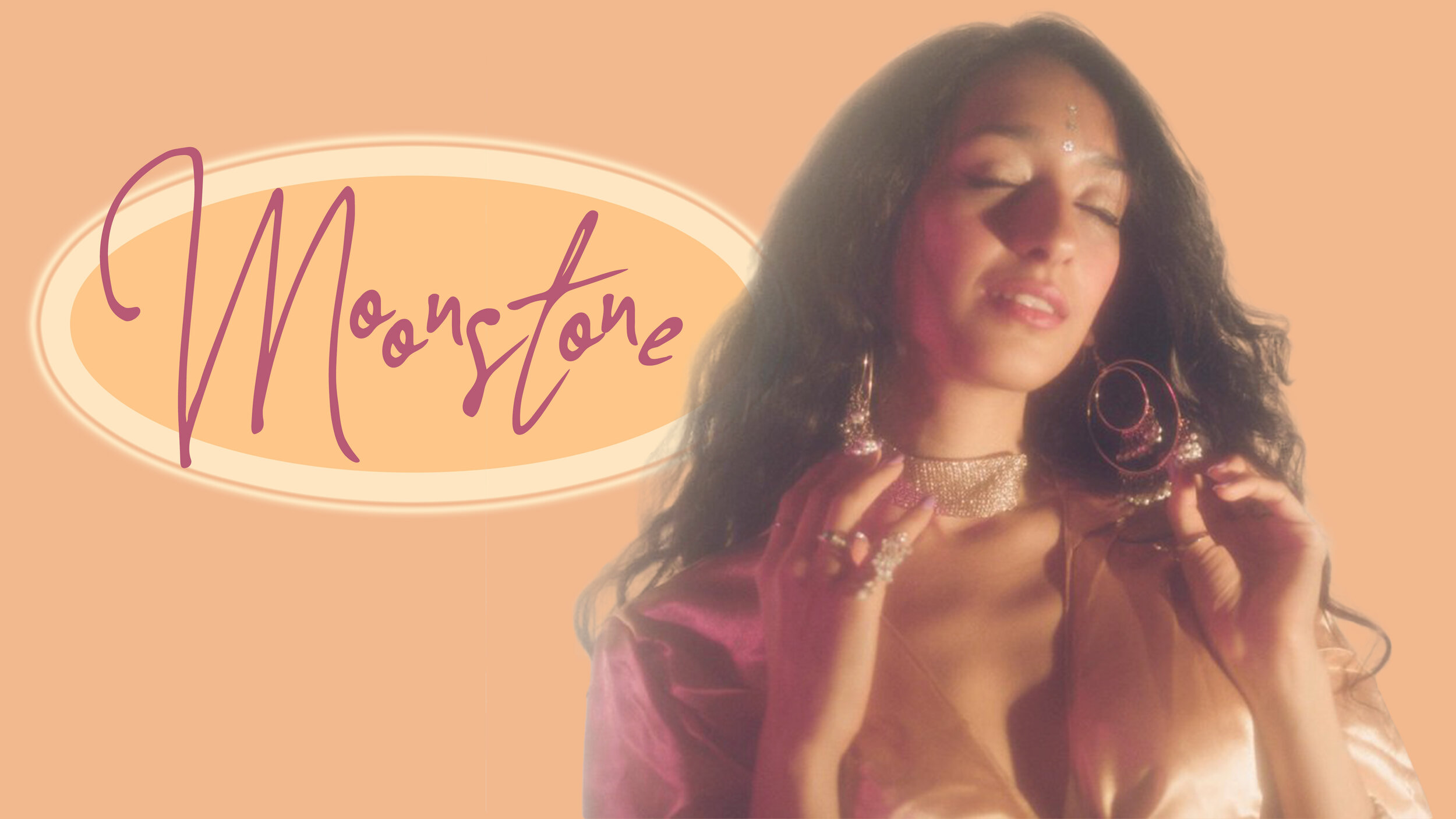Exploring Raveena’s Ethereal and Existential ‘Moonstone’ EP
by Angelee Gonzalez
In crystal healing, the ancient moonstone is recognized for its promotion of new beginnings. Its healing properties range from spiritual insight to love and hope, and it stands as a symbol of strength and personal growth. New York-based R&B goddess Raveena’s Moonstone EP reflects a similar meaning.
Raveena Aurora, known in the music world as just Raveena, makes music that is somehow even more lovely than her birth name. Born in Massachusetts to Indian immigrants escaping the 1984 anti-Sikh riots, her family later settled in New York City’s borough of Queens, where R&B and soul became her strongest influences.
Raveena is making strides in the music world with her dream-pop twist on ‘70s and ‘90s R&B, all of which was produced by longtime collaborator Everett Orr. She stands out in the rapidly-expanding alternative R&B subgenre as a queer woman of South Asian heritage, and the conflict of these identities is a recurrent and nuanced topic in her lyrics. In her coming-out post on Instagram in October 2018, she described her bisexuality and Indian ethnicity as “oil and water…something that simply couldn’t mix.”
Despite this sentiment, Raveena has fully embraced her culture, especially in her visual aesthetic. Her photography sessions and music videos present her in lavish surroundings and cultural dress, promoting the luxe and natural beauty of her heritage. Raveena’s aesthetic is also influenced by her interests in spirituality; she adorns herself with crystals and flowers in appreciation for the earth.
Continuing this theme, opal gems surround Raveena’s eyes on the cover of her new Moonstone EP. It accompanies her debut album Lucid (2019), where she reflected on a variety of issues and identities, including divine femininity, her Indian heritage, and her status as a survivor of sexual assault. On Lucid, Raveena works through her past in the form of dreamy R&B ballads, manifesting a future in good hands and self-acceptance.
The tracks on Moonstone EP were recorded during Lucid’s sessions, yet Raveena has said in interviews that this collection has its own story to tell. While both projects share dominant sounds of soft snare drums and sweet guitar chords, Raveena’s story on Moonstone EP is clearly told from a better place; her lamentations have been replaced with songs that celebrate new love and the natural world.
The first track “Headaches” describes falling in love as an involuntary physical reaction that leaves her dizzy. Distorted guitar rhythms and her tender, romantic voice melt together against low bass. She sings “I’m dizzy with headaches / I need a medic / Can you stay still while I’m like this?” While this new love has an intense effect on Raveena, she is still grateful, and The metaphors of headaches and dizziness are well-exemplified in the single cover and music video, which Raveena directed herself in her apartment.
From Moonstone EP, available now: https://empire.lnk.to/Moonstone_EP Director: Raveena Aurora Starring: Hitomi Mochizuki and Raveena Aurora Producer: Jake De…
What the music video depicts perfectly is the outro’s induced rush of emotion. The rhythm suddenly bursts into faster-paced drums and guitar strums, and Raveena’s gentle vocals float above it all. As the song dies down, a simple acoustic melody beautifully restores the balance.
“Close 2 U” furthers the EP’s emotional development with a scene of Raveena’s lover needing to pack their belongings and move away. Against an arrangement of wilting guitar chords, the line “too close to you” refrains at the end, emphasizing how much their departure will hurt her (and likely alluding to budding trust issues from past trauma).
Trust issues turn into new hope on “Heartbeat,” where Raveena asks “Can a man be really like this?” It’s an idyllic display of Raveena’s songwriting abilities; its first set of lyrics transports listeners to cold waters and blue-lit midnight, where she dances so close to her lover that she can feel his heartbeat.
From the first chord to the last, “Starflower” stands out as exclusively acoustic. Her voice is lilted and weightless, inducing a feeling of release from pain and reality. In this final track, Raveena sings that starflowers are the stars of the earth, and through this, she connects the astral world to our own grounds. It closes the EP with a lasting message of Raveena’s newfound harmony with the world.
As a whole, Moonstone extends Raveena’s narrative with new understandings of the universe and her place in it. Moonstone is the perfect sequel to Raveena’s self-dissection on Lucid, and through its sweet songs of realization, acceptance, and admiration, she shares the feeling of finally finding closure.

